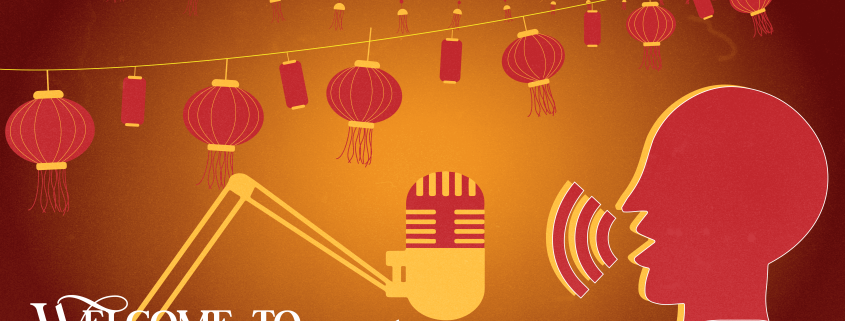Podcast season explores L.A. Chinatown

While studying at the USC School of Law in the 1920s, You Chung “Y.C.” Hong wrote his thesis on the Chinese Exclusion Act, a prohibition on the immigration of Chinese laborers that lasted more than 60 years. The first Chinese American graduate of USC’s law school, Hong spent the greater part of his career as an attorney focused on reforming racist legislation, such as the Chinese Exclusion Act, and advocating for thousands of Chinese immigrants in America.
Hong’s story is documented in the newest season of the Huntington-USC Institute on California and the West’s podcast, “Western Edition.” ICW — a joint teaching, education and outreach initiative between the USC Dornsife College of Letters, Arts and Sciences and the Huntington Library to investigate the history and culture of California and the American West — launched “Western Edition” in 2021. The podcast aims to connect the past and the present and share stories of the people and communities of the American West.
ICW kickstarted the release of the podcast’s second season, “Western Edition: L.A. Chinatown,” Tuesday and will continue to release episodes through June 28. Several USC faculty supported the research for “Western Edition’s” six-episode second season.
“Western Edition: L.A. Chinatown” will explore the history of one of Los Angeles’ oldest neighborhoods, a cultural and business hub popular among tourists and locals and a long-standing center for the Southern Californian Chinese American community. L.A. Chinatown offered Chinese immigrants pursuing the American Dream safety and connection, but also bore witness to challenging periods of displacement and racial discrimination.
“It’s important for people to understand the deeper history of Chinatown in L.A.,” said William Deverell, ICW director and professor of history. “It’s important to understand the ethnic and immigrant history of Los Angeles through that lens.”
“Western Edition: L.A. Chinatown” releases amid a surge of racism and violence against Asian Americans following the start of the coronavirus pandemic in 2020. NBC News reported that, in 2021, recorded anti-Asian hate crimes rose by 339% from 2020 levels, and many cities, including New York, San Francisco and L.A., surpassed their record numbers.
“We also think it’s important, in a period of anti-Asian hate and violence, to talk about the long histories of those reflexes and that ugliness in the regional past, to put it into historical context, to remind people that tragically it’s not new and to see if we can utilize history to build awareness and, hopefully, as a byproduct of that, build community,” Deverell said.
“Western Edition: L.A. Chinatown” builds off of ICW’s ongoing Chinatown History Project.
Before the rise of “New Chinatown,” much of L.A.’s original Chinatown — a vibrant neighborhood home to thousands of people, apartments, boarding houses and restaurants — was demolished in the 1930s to make way for the construction of Union Station and other civic projects.
Guided by a rich photo collection documenting “Old Chinatown,” the ICW’s Chinatown History Project is recovering the neighborhood with historical research and innovative augmented reality experiences. The project is a collaboration with historian Greg Hise, the Chinese Historical Society of Southern California and the Huntington Library.
According to a press release, the second season of “Western Edition” seeks to uncover a more comprehensive understanding of the past, present and future of L.A.’s Chinatown and promote a greater awareness of the neighborhood and its people. The season features interviews with longtime Chinatown residents, activists, artists and academics who can speak to the neighborhood and its community, said Jessica Kim, an associate professor of history at Cal State Northridge and ICW social media manager.
“It’s this really rich tapestry of voices of people who’ve been, through family or through their academic work or their activism, involved in protecting Chinatown, protecting the legacy of the Chinese American community in Southern California, [and] thinking, too, about the future of Chinatown and in what ways is that community able to survive and face challenges such as gentrification and climate change,” said Kim.
One of the season’s episodes will focus on Union Station’s displacement of original L.A. Chinatown residents and the subsequent creation of “New Chinatown.” Another will dive into current challenges faced by the L.A. Chinatown community, including anti-Asian hate and gentrification. The season will also cover the diversity of perspectives on what Chinatown represents, the horrific 1871 Chinese massacre and the story of Y.C. Hong.
“I hope people take away from [the season] the tension between a really long history of very violent and brutal racism against Asian and Chinese immigrants in the United States, but also the ongoing resiliency and efforts to create more racial equality and racial justice,” Kim said.
Li Wei Yang, the Huntington’s Pacific Rim Collections curator, said he believes “Western Edition: L.A. Chinatown” also honors the advances fought for by Chinese Americans in the past, a legacy felt in current Chinese American experiences.
“It is because of their fighting for civil rights, their fighting against exclusion and all these immigration restrictions that were put in place against the Chinese, especially in the 19th century — because of the fight against it by the Chinese American activists — that we’re able to enjoy the freedom and the rights that we have today,” Yang said.
“Western Edition: L.A. Chinatown” is produced by Avishay Artsy, Katie Dunham, Elizabeth A. Logan, Olivia Ramirez, Stephanie Yi, Hise, Kim and Yang. Deverell, who also hosted the first season of “Western Edition,” will return as host.
“Western Edition: L.A. Chinatown” will be available on several audio streaming platforms including Apple Podcasts and Spotify. Episodes will be released weekly on Tuesday.

